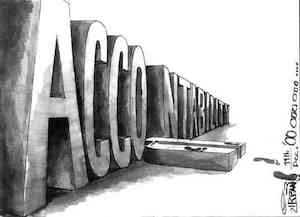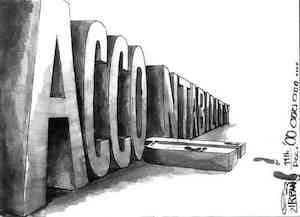- February 21, 2014
- Posted by: andreag
- Category: LeadershipOrg CulturePerformance ManagementStrategic Planning

How to accomplish the work of your strategic plan
One of the challenges we see most often with completing the work spelled out on a strategic plan is that leaders don’t hold their team accountable for the results. Instead, they succumb to the old habit of accepting rational explanations for why things do not get accomplished. Getting accountability for results on a strategic plan is challenging. Unless we are punitive by nature, we don’t like calling out people on their misdeeds and broken promises. Rather, we want to see ourselves as supportive, understanding, forgiving. That’s all well and good, but this leadership behavior will not move the organization ahead.
“Excuses are the opiate of the unsuccessful,” as Faust, Lyles and Phillips state in their book, Responsible Managers Get Results: How the Best Find Solutions – Not Excuses.
Demanding strategic plan results
Why is demanding results so challenging? First, we are all overcommitted, and so we tend to buy any reason for a failure to complete tasks. Too many emails, problems at home, unforeseen glitches, lack of cooperation from others, and so on. Strategic and project plans often define what we are expected to do, above and beyond our normal jobs (our change agenda). The real problem is that our normal jobs are probably already overwhelming.
Potential leaders have to do one of two things: accept the fact that they won’t be able to lead the group to a new level of performance, or commit to doing whatever is required to reach that new level by insisting on performance from their teams.
We too often see leaders pick the first, albeit, not outright. But when no action is the action chosen, the result is low performance. If, as it should, the strategic plan contains the essential elements for the organization’s success in the future, excuses are simply not options. They threaten future survival.
Here are a few tips that will help leaders become more effective in improving performance on their plan:
- As a leadership team, review the progress and results to date on the strategic plan every two weeks. This simple act of coming together to review what has and has not been accomplished will spur improved performance (no one likes to be behind). I call it management by embarrassment.
- If team members have failed to meet goals, ask them what they have chosen to do in place of fulfilling their promise to the group. Ask if they want to make a new promise, or if they would rather have their task or responsibility assigned to someone else.
- Meet individually with those who repeatedly present excuses for not fulfilling their promises. What in their life is getting in the way? Do they need better tools for personal time management? Have they simply overcommitted? Coach them to achieving better performance.
The leadership team that created the strategic plan is accountable to the organization for the results outlined therein. As a leader, emphasizing the progress toward achieving those results on a bi-weekly basis drives home your commitment to make this year’s strategic plan a top priority.
One caveat to success here, before any meeting to review progress can be scheduled, accountability and due dates for the work on each strategic project needs to be assigned to individuals on the leadership team. If you are looking at a plan without those responsibilities assigned, it is not too late. Get out the document and put down some due dates and team member names. Then start your update meetings and watch your team and your plan come to life.
Need some help with assigning responsibility, coaching team members or driving accountability? I am happy to dialogue with you. Send me an e-mail to get started.




